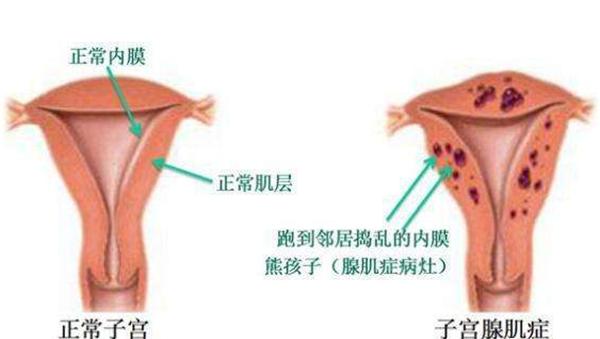Adenomyosis is a relatively common gynecological disease, and women with adenomyosis will not only affect their physical health, but also affect pregnancy. So, what is the relationship between adenomyosis and pregnancy?

Adenomyosis has adverse effects on fertility, and the mechanisms mainly include endometrial tolerance changes, abnormal levels of uterine oxygen free radicals, and immunomodulatory disorders. Adenomyosis is also not conducive to the outcome of IVF, which is manifested by a decrease in implant rate, clinical pregnancy rate, sustained pregnancy rate, live birth rate, increased miscarriage rate, and a significant increase in the probability of preterm birth and premature rupture of membranes. Therefore, with adenomyosis, doctors generally recommend immediately preparing for pregnancy, the sooner the better, because the disease is progressive, it will only become more and more serious, and the earlier the pregnancy preparation, the higher the success rate.
If it is found that adenomyosis is in the early stages, that is to say, the condition is not very obvious, the hyperplasia is not particularly serious, and the uterus is not enlarged because of this, it really does not have much impact on pregnancy. If adenomyosis develops to the middle and late stages, then the uterus will definitely become larger due to the continuous accumulation of the endometrium, then in this case, the environment inside the uterus is very small, when the sperm is difficult to combine with the egg cells to become a fertilized egg, it will become very difficult to implant on the endometrium, so there is no way to get pregnant in this case.
Patients with adenomyosis and infertility should first ask a detailed medical history, including the age of infertility, clinical symptoms, diagnosis and treatment, whether there is a history of recurrent miscarriage or repeated embryo implant failure, whether there is pelvic endometriosis, uterine fibroids, endometrial polyps, and hydrosalpinx. A comprehensive fertility assessment is required, including ovarian reserve function (age, number of sinus follicles, anti-mullerian hormone, basal endocrine level), tubal patency test, whether the ovaries have normal ovulation, semen analysis of the man, etc., and a comprehensive analysis of whether assisted reproductive technology is required for fertility.
The choice of assisted reproductive treatment should be individualized, combined with the specific conditions of the patient and the patient's wishes, and comprehensively consider the plan, in order to achieve pregnancy in the shortest possible time.
If you are young in your early 20s or very ill, you can prepare for pregnancy for half a year. If you are older, it is recommended that you do not blindly try to conceive on your own, go directly to the reproductive department to monitor ovulation, and go to the same room according to the doctor's arrangement, in this process, the doctor will pay attention to your endometrium, hormones and other conditions, as needed medication, greatly improving the success rate.
People who are elderly, have decreased ovarian function, or who are infertile in men can directly undergo IVF to assist in conception. Patients with large adenomyomas, severe dysmenorrhea, and compression and deformation of the uterine cavity should be prepared for pregnancy after surgery if necessary. Patients with decreased ovarian reserve function and advanced age (≥35 years of age) can first cryopreserve fertility of embryos, and then undergo frozen embryo transfer after adenomyosis/tumor treatment.
Love Bolai's treasure sister warm tips: prevention of adenomyosis is the key, when diagnosed adenomyosis, we need to prepare for pregnancy in time, develop good living habits, although the treatment of adenomyosis is difficult, but it is not that there is no chance of pregnancy, so even if the diagnosis of adenomyosis, we do not worry too much, keep a normal mind, active treatment can be.